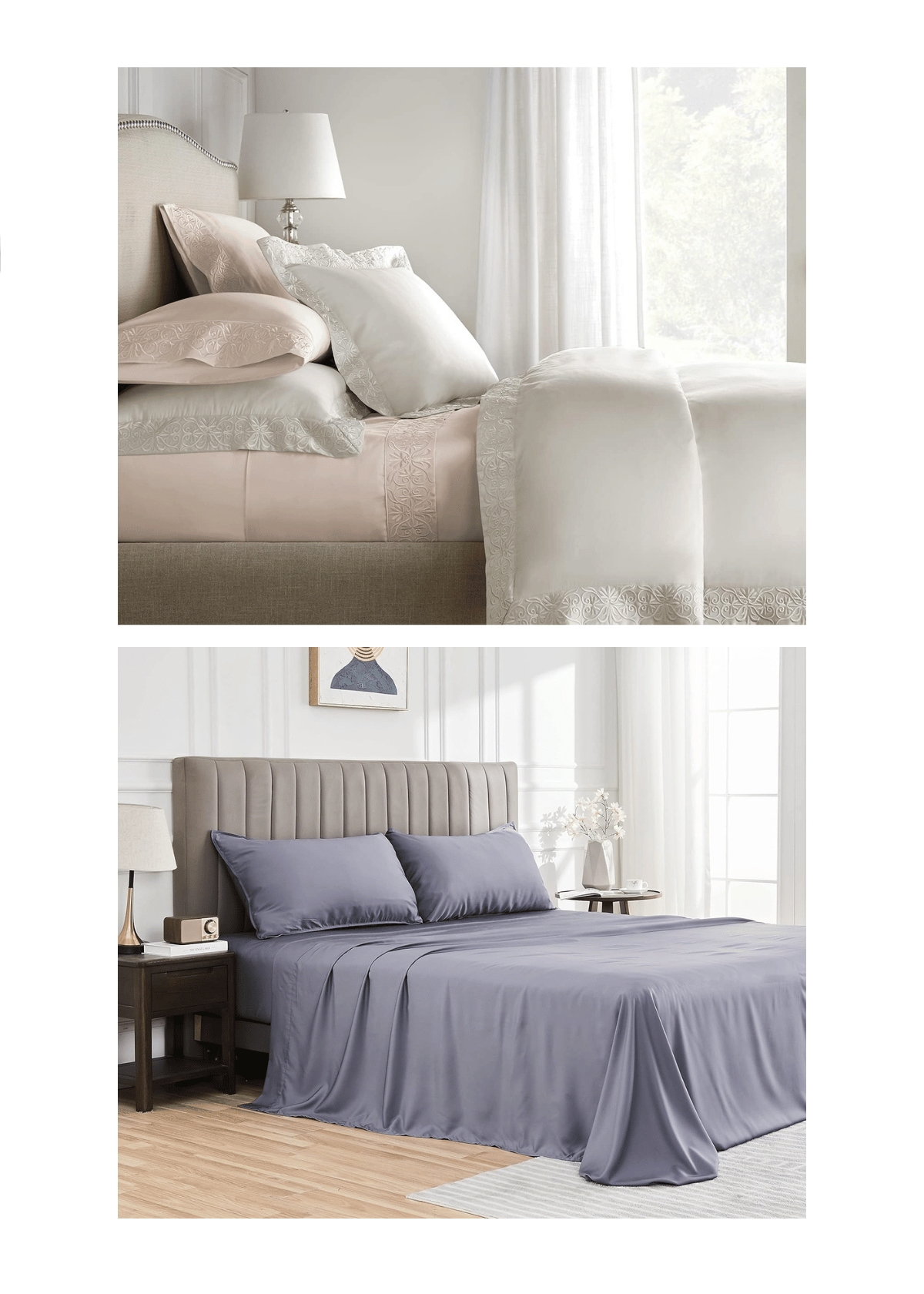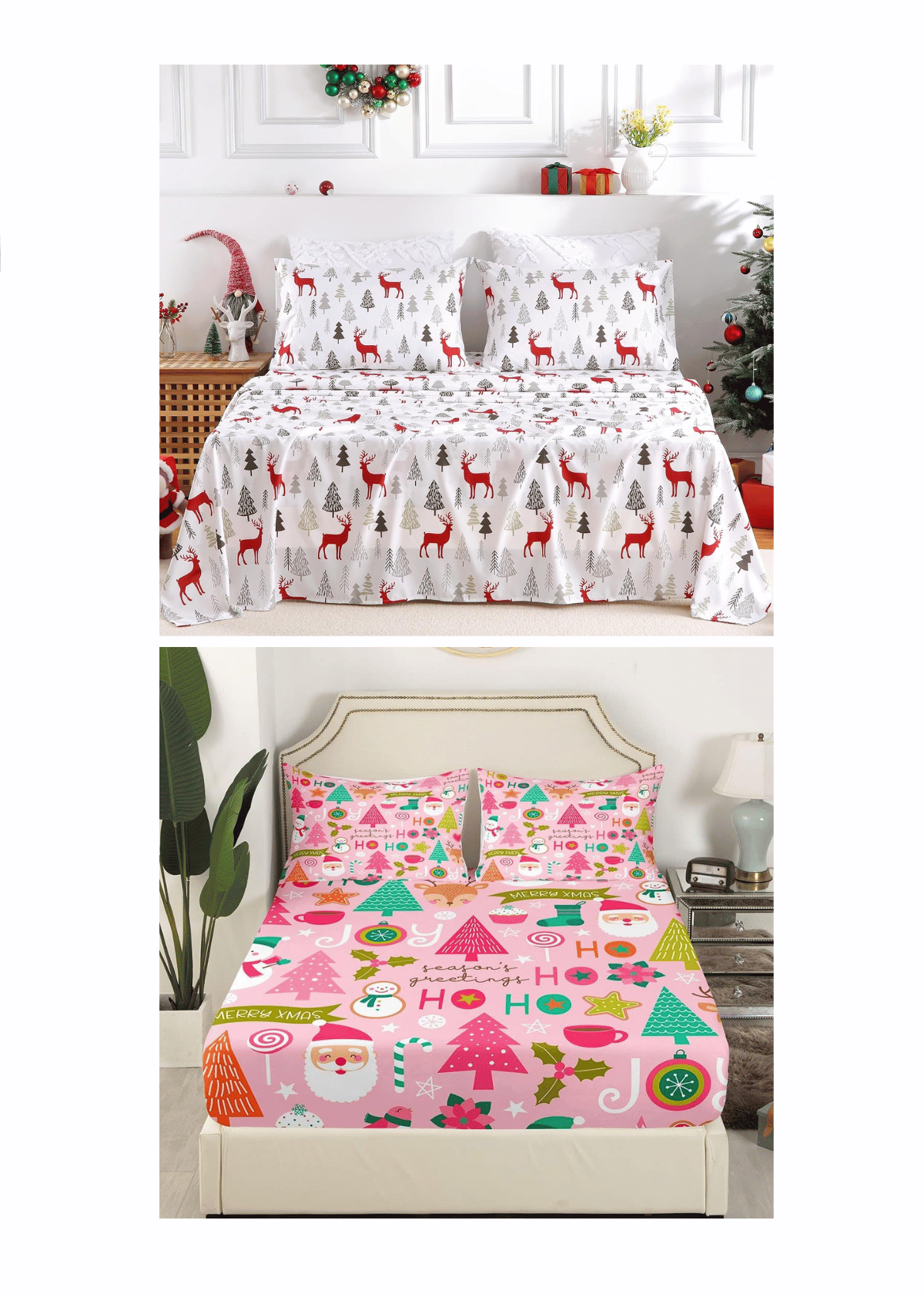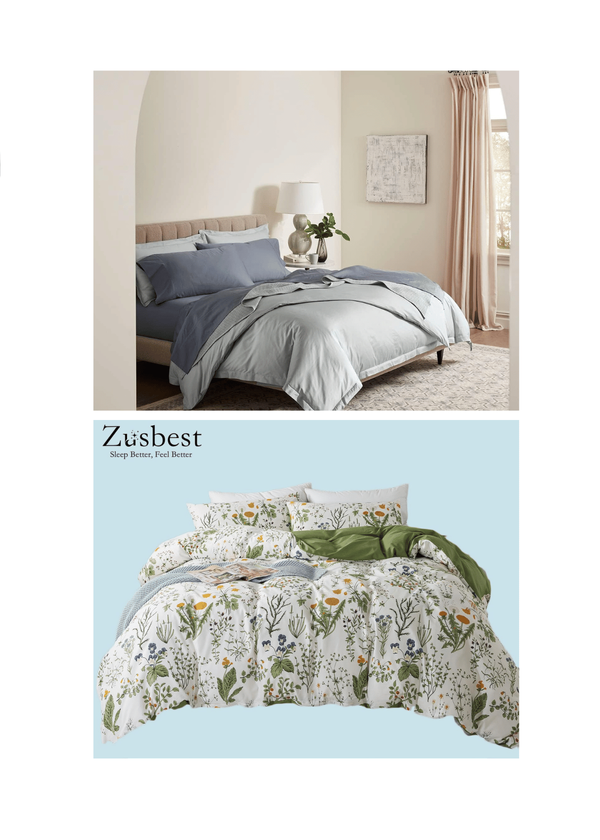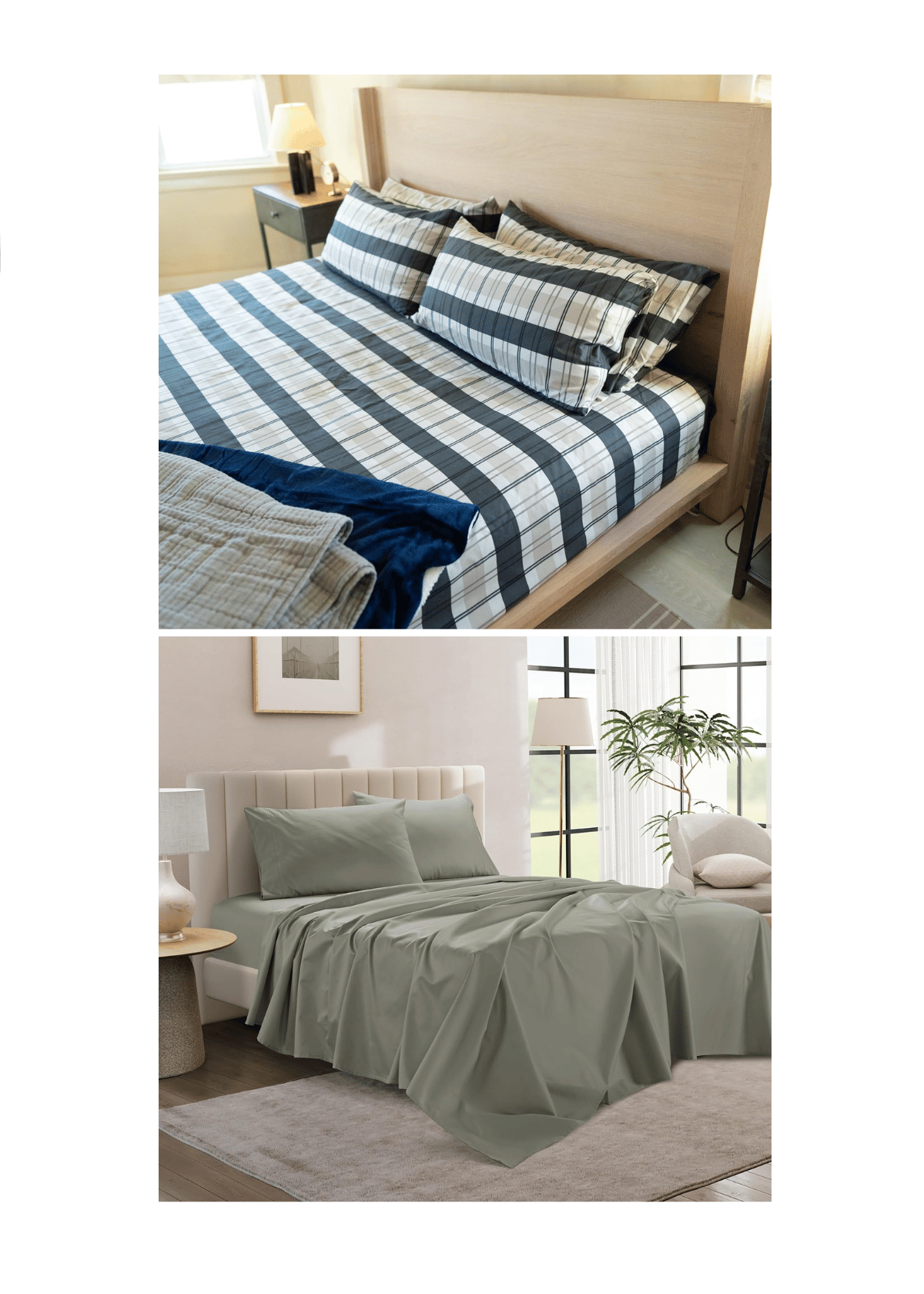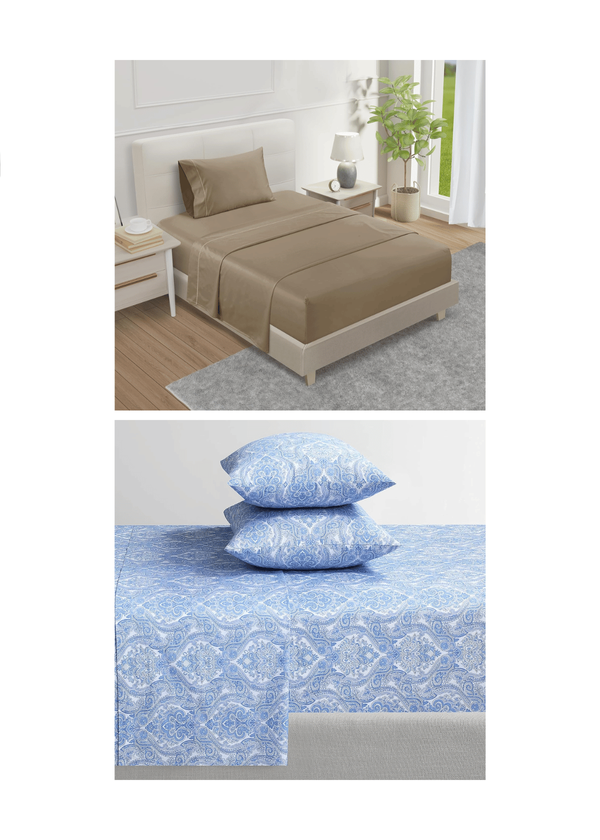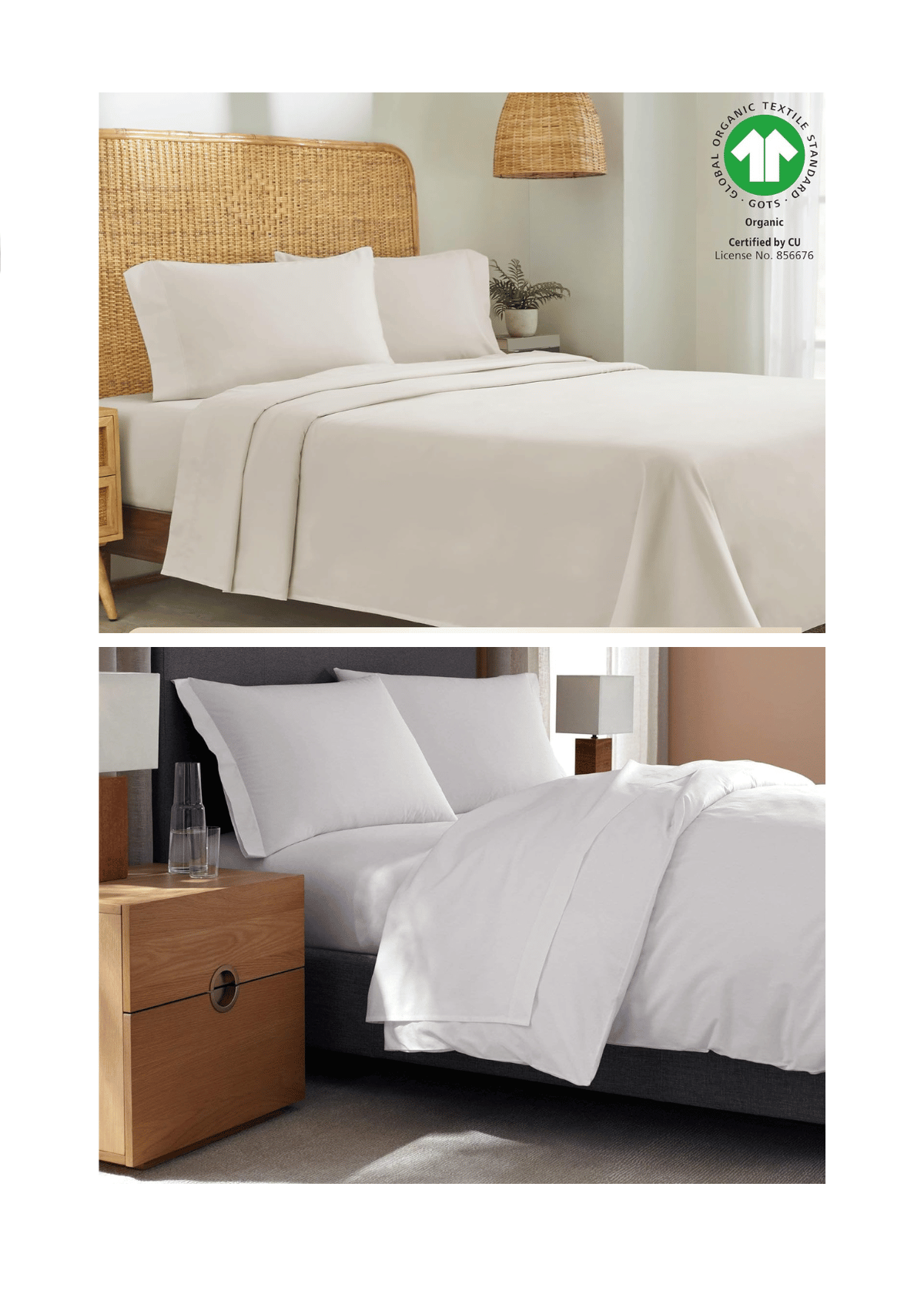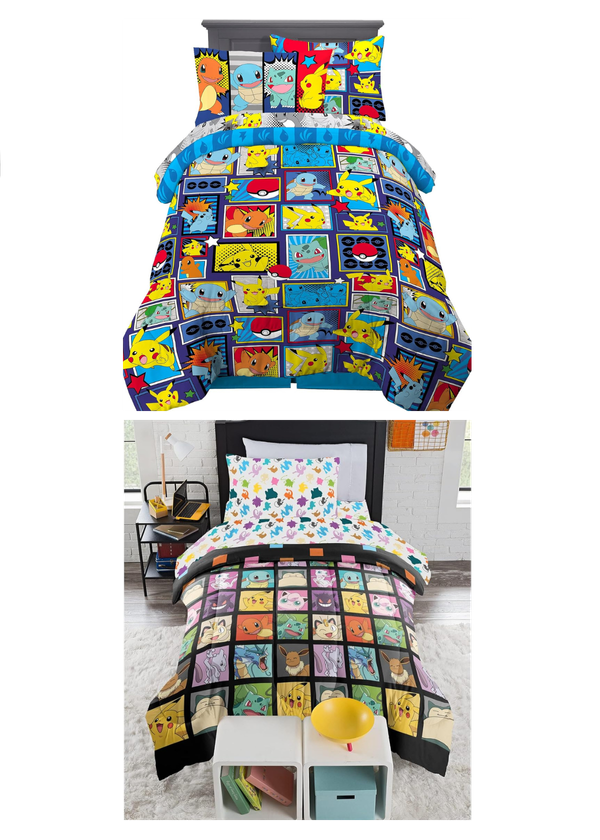(Last Update: 04/06/2024)
Have you ever wondered if your bed sheet thread count matters?
Choosing the right thread count for sheets can make all the difference between a bad night and a great night’s sleep.
But with so many choices, how do you know which is best for you?
In this post, I’ll discuss the best thread count for comfort, debunk common myths, and help you find the perfect sheets for a good night’s sleep.
What is Thread Count?
Thread count is the number of threads in one square inch of fabric. It’s the basic measurement for bed sheets' softness, durability, and feel.
- Definition: The total number of vertical (warp) and horizontal (weft) threads.
- How it’s measured: Add the warp and weft threads together.
- Common ranges:
- Low thread count: 150-300
- Medium thread count: 300-500
- High thread count: 500+
Higher thread counts mean softer sheets, but other factors like fabric and weave style also come into play.
How Thread Count Affects Bed Sheet Quality
Thread count is often seen as the key to quality, but it’s not the only thing to consider when choosing bed sheets. Here’s how it affects comfort, durability, and breathability:
Comfort:
- Higher thread counts (300-500) are smoother and softer.
- Lower thread counts (150-300) are coarser but more breathable.
Durability:
- Medium to high thread count sheets are more durable.
- Extremely high thread count (above 800) can pill due to thinner threads.
- Very high thread count can mean multiple thin strands twisted together to form one yarn, resulting in weaker sheets with less breathability.
Breathability:
- Lower thread counts are more breathable, so good for hot sleepers.
- Higher thread counts create denser sheets, which can trap heat.
What’s the Ideal Thread Count Range
Different thread count ranges serve different purposes. Knowing what each range offers will help you choose the right sheet set. A good thread count for quality bed sheets is between 400 and 600, soft and durable without sacrificing breathability.
Low Thread Count (150-300):
- Best for lightweight and breathable cotton bed sheets.
- It is good for hot climates or those who overheat at night.
- Made from percale or basic cotton.
Medium Thread Count (300-500):
- Balances softness and durability.
- It is comfortable and cozy for most sleepers without sacrificing breathability.
- It is found in high-quality fabrics like Egyptian cotton or bamboo.
High Thread Count (500-1,000):
- Best for those who want luxurious, super-soft sheets.
- May feel heavy and less breathable, good for cold sleepers.
- Higher thread count can be a marketing ploy; manufacturers use multi-ply threads to inflate the count.
Fabric Weave and Thread Count
Another factor to consider in bed sheet quality is the fabric weave, which is determined by the arrangement of vertical and horizontal threads. The weave affects the feel, durability, and breathability of your sheets:
Percale Weave:
- Crisp and breathable with a matte finish.
- Found in lower thread counts (200-400) for a cool, lightweight feel.
- It is good for hot climates or those who overheat at night.
Sateen Weave:
- Silky, luxurious with a slight sheen.
- Works well with higher thread counts (300-600) for soft, smooth sheets.
- Good for those who want a heavier, warmer feel.
Twill Weave:
- Diagonal weave pattern, durable and soft fabric.
- For heavier fabrics like flannel, twill-woven sheets are good for cold climates or those who want extra warmth.
Thread Count vs. Fabric Type
While thread count is important in determining bed sheet quality, fabric type is just as important. Different materials perform better at different thread counts:
Cotton:
- Soft and breathable at medium to high thread counts.
- Egyptian and Pima cotton is extra soft at 300-400 thread counts.
- Cotton sheets, especially long-staple or Egyptian cotton, are the gold standard of quality and comfort and feel luxurious.
Linen:
- Naturally breathable and durable, linen sheets have lower thread counts (80-150) but still high quality and comfort.
Bamboo:
- Silky feel and natural cooling at lower thread counts (250-350).
Microfiber:
- Made from synthetic fibers, microfiber sheets are soft even at lower thread counts.
Fiber Content and Its Effect on Sheet Quality
Fiber content is a major factor impacting the overall quality of bed sheets. Different fibers bring different properties, from softness and breathability to durability and eco-friendliness.
Cotton is the classic choice for bed sheets. It is breathable, soft, and durable. Egyptian cotton stands out with its extra-long staple fibers for added strength and luxurious softness. Pima cotton is also silky and long-lasting, a great choice for high-quality sheets.
Linen sheets made from flax fibers are breathable and moisture-wicking. They regulate temperature naturally, which is good for hot climates and those who overheat at night. The linen gets softer with each wash.
Bamboo sheets are gaining popularity for their softness and eco-friendliness. Made from bamboo fibers, these sheets are breathable and moisture-wicking, good for hot sleepers.
On the other hand, synthetic fibers like polyester and microfiber are used in bed sheets because they are affordable and durable. Although they may not have the same breathability or softness as natural fibers, they are easy to care for and wrinkle-resistant.
Blends of different fibers can also create bed sheets with unique properties, combining the best of both worlds. For example, a cotton-polyester blend can have the softness of cotton with polyester's durability and wrinkle resistance.
Knowing the fiber content of bed sheets can help you choose the right set for your needs and ensure a comfortable night’s sleep.
LOW THREAD COUNT (150-300)
Mellanni Iconic Sheet Set

Thread Count Features: This set uses brushed microfiber with a thread count of under 300, offering softness without needing higher thread counts. Its cooling properties make it ideal for those who overheat during sleep.
Benefits: The low thread count provides breathability, making the sheets soft and cooling for hot sleepers. Its 16-inch deep pockets ensure a snug fit on most mattresses, enhancing comfort throughout the night.
VASROY Cooling Breathable Bed Sheets Set

- Thread Count Features: With a 250 thread count, these sheets are crafted from regenerated cellulose fibers, giving them a silky-soft finish. They are lightweight yet durable and machine washable for easy care.
- Benefits: These sheets' breathable nature ensures a cooling sleep experience, perfect for warmer climates. Their 16-inch deep pockets make them adaptable to thicker mattresses, promoting smoother and more restful sleep.
Royal Hotel Bedding Abripedic Crispy Percale Sheets

Thread Count Features: At the 300-thread count, these percale sheets are made from 100% cotton, offering a crisp and cool feel. The deep pocket design fits mattresses up to 18 inches, adding convenience.
Benefits: These breathable sheets are perfect for hot sleepers who want a crisp, clean feel against the skin. The 300-thread count ensures durability while maintaining softness, providing a refreshing night’s sleep.
Chateau Home Tencel Lyocell Sheet Set

- Benefits: The Tencel fibers provide a smooth and cooling surface, ideal for hot sleepers. With deep pockets and a luxurious feel, these sheets help create a comfortable, eco-friendly sleep environment.
Thread Count Features
: This set boasts a 300-thread count made from Tencel Lyocell fibers, known for their sustainability and softness. The fabric is breathable, lightweight, and moisture-wicking.
MEDIUM THREAD COUNT (300-500)
California Design Den Bedsheet Sets

- Thread Count Features: These sheets have a 400-thread count and are made from 100% cotton with a sateen weave. They are extra soft, designed for breathability, and have a cooling finish.
- Benefits: Ideal for year-round use, the moderate thread count offers a perfect balance between softness and durability. The deep pockets ensure a snug fit, making them comfortable for a refreshing sleep.
Mayfair Linen 100% Cotton Sheets

- Thread Count Features: With a 500-thread count, these cotton sheets offer a luxurious feel. The sateen weave enhances the softness, making the sheets breathable and comfortable for hot sleepers.
- Benefits: These sheets are ideal for those seeking a soft, smooth sleep surface that stays cool overnight. The deep pocket design ensures a secure fit on thicker mattresses.
CGK Unlimited 4 Piece Sheet Set

- Thread Count Features: This 200-thread-count microfiber sheet set is designed to be ultra-soft, breathable, and lightweight. The material offers wrinkle-free maintenance and extra-deep pockets.
- Benefits: The low to medium thread count makes the sheets breathable and perfect for hot sleepers. The deep pockets ensure the sheets stay securely in place, providing a luxurious hotel-like sleep experience.
Pure Parima Luxury 100% Certified Egyptian Cotton Sheet Set

- Thread Count Features: This 400-thread count Egyptian cotton set offers a high-end finish with extra-long staple fibers. Its breathable and cool properties make it perfect for luxury bedding.
- Benefits: These sheets' softness and cool feel create a comfortable sleep environment. Designed for breathability, they wick away moisture and help prevent overheating, ensuring a restful night’s sleep.
HIGH THREAD COUNT (500+)
Threadmill Luxury 800 Thread Count 100% Cotton Sheets

- Thread Count Features: These sheets feature an 800-thread count, offering a dense, soft, and luxurious feel. The sateen weave enhances the silky texture, making the fabric smooth and breathable.
- Benefits: These high-thread-count sheets are perfect for cold sleepers and offer excellent warmth and coziness. The 15-inch deep pockets make them ideal for thicker mattresses, ensuring comfort and durability.
THREAD SPREAD 100% Pure Egyptian Cotton Sheets

- Thread Count Features: These 1000-thread count Egyptian cotton sheets offer unparalleled softness and luxury. The sateen weave adds a smooth, glossy finish, ideal for an opulent sleep experience.
- Benefits: High-thread-count sheets like these provide a denser, warmer feel, perfect for cold climates. The deep pockets and cooling properties ensure a comfortable sleep with a secure fit on thicker mattresses.
Danjor Linens Queen Sheet Set

- Thread Count Features: This 1800-thread-count microfiber set offers an ultra-soft feel and deep pockets that fit thicker mattresses. The fabric is wrinkle-resistant and easy to care for.
- Benefits: The high thread count ensures maximum softness and comfort, making these sheets perfect for those who prefer a luxurious sleep experience. The wrinkle-free design adds convenience and style to your bedding.
PeachSkinSheets Mariner Blue Sheet Set

- Thread Count Features: These sheets are soft at a 1500-thread count, offering a silky, breathable feel. The fabric is moisture-wicking and designed for hot sleepers.
- Benefits: The high thread count ensures a smooth, luxurious feel while remaining breathable. These sheets are ideal for those who experience night sweats, as they help regulate body temperature for better sleep.
Minor Monkey 1000 Thread Count Egyptian Cotton Sheets

- Thread Count Features: These sheets boast a 1000-thread count. They are made from Egyptian cotton with a sateen weave for a soft, luxurious feel. They are designed to fit deep mattresses with 16-inch pockets.
- Benefits: The high thread count provides warmth and softness, perfect for cold sleepers. The deep pockets and durable construction ensure a snug fit and long-lasting comfort.
Construction: How It Affects Sheet Performance
The construction of bed sheets, or how fibers are woven together, is a major factor in their performance. The type of weave, thread count, yarn type, and finishing treatments all affect the sheets' feel, durability, and care.
Percale is popular for its crisp, cool feel and matte finish. Breathable and durable, percale sheets are found in lower to medium thread counts (200-400) and are good for hot sleepers or warm climates.
Sateen is silky and smooth with a slight sheen. This weave works well with higher thread counts (300-600) for a luxurious feel for those who prefer a warmer sleep environment.
Twill weave creates a diagonal pattern, making the fabric durable and soft. Twill-woven sheets, used for heavier fabrics like flannel, are good for cold climates or for those who want extra warmth.
Bed sheets' thread count is also affected by their construction. Higher thread counts mean a denser weave, which can affect softness and breathability. However, extremely high thread counts (above 800) may use multi-ply yarns, which can sometimes compromise quality.
Another important factor is the type of yarn used to construct bed sheets. Single-ply yarns are made from one continuous strand of yarn, resulting in lighter, softer, and more breathable sheets. Multi-ply yarns involve twisting multiple strands together, making the sheets feel heavier, but may only sometimes mean better quality.
Finishing treatments applied to the sheets can also affect their performance. Some treatments make them softer, while others make them more durable or wrinkle-resistant. These treatments can also affect the care instructions; some sheets require more delicate handling.
Knowing how bed sheets are constructed can help you make more informed buying decisions and choose the right set for your needs and preferences. Knowing how construction affects performance will help you find the perfect set for a good night’s sleep, whether you prefer softness, breathability, or durability.
Common Thread Count Myths
Thread count is often misunderstood, and manufacturers can manipulate it to create false impressions of quality. Here are some common myths:
- A higher thread count does not necessarily mean better sheets. Above 500, the difference in softness is minimal, and extremely high thread counts can reduce breathability.
- More threads mean better durability. Sheets with a thread count above 800 may use thinner, weaker threads, which can wear out faster.
- All high-thread-count sheets are the same: Fabric type and weave matter just as much. For example, a 400-thread-count Egyptian cotton sheet can feel softer than an 800-thread-count sheet made from a lower-quality cotton blend.
- The advertised thread count is always accurate. However, it can be misleading, especially when different ply counts are involved. Manufacturers can inflate the thread count by counting multi-ply threads, which can distort the actual quality of the sheets. Lower actual thread count can sometimes mean better quality when evaluated correctly.
Is Higher Thread Count Better for Bed Sheets?
Choosing the right thread count depends on personal preferences, sleeping habits, and climate. Here’s how to decide which thread count is best for you:
- For Hot Sleepers:
- 200-400 thread count. Sheets in this range are more breathable let heat escape, and air circulate better.
- Lightweight fabrics like cotton or bamboo at lower thread count can wick away moisture and keep you cool overnight.
- Percale weave sheets to further enhance breathability.
- For Cold Sleepers:
- 400-600 thread count for extra warmth and coziness. Heavier sheets with higher thread count tend to trap heat, giving a more insulated feel.
- Sateen weave sheets feel soft and warm, perfect for cold sleepers or colder climates.
- For Balanced Comfort:
- 300-500 thread count is the sweet spot for most people. Sheets in this range are the perfect balance of softness and breathability, comfort year-round.
- High-quality fabrics like Egyptian or organic cotton offer exceptional softness in this range without sacrificing breathability.
- For Durability:
- 300-500 thread count for durability without compromising comfort. Sheets in this range last longer and can better withstand frequent washing.
- Single-ply threads are stronger and more durable than multi-ply threads, making the sheets more resistant to wear and tear.
Thread Ply and Yarn Quality
When buying bed sheets, thread ply and yarn quality should be considered. These two elements, regardless of the thread count, affect the sheets' feel, durability, and lifespan.
Understanding sheet thread count is important because it plays a big role in determining quality.
Higher thread count doesn’t mean softness and durability; it’s not the only quality indicator. The ideal thread count is 300-500, and a high thread count may be caused by misleading marketing.
- Thread Ply:
- Single-ply threads: Made from one continuous strand of yarn, single-ply sheets are lighter, softer, and more breathable. These threads create a stronger and smoother fabric, perfect for people who want long-lasting sheets.
- Multi-ply threads: This method involves twisting multiple strands of yarn together, often to artificially inflate thread count. While multi-ply threads can make sheets feel heavier, it doesn’t always mean higher quality. Sometimes, multi-ply sheets are more prone to pilling and wear over time.
- Yarn Quality:
- Long-staple cotton: The length of the cotton fiber (or staple) is important in determining the sheet’s softness and durability. Like Egyptian or Pima cotton, long-staple cotton produces finer threads and creates smoother and more durable fabric.
- Short-staple cotton: Shorter fibers create rougher fabric with more loose ends, resulting in a less soft feel and higher pilling over time.
- The Impact on Comfort and Durability:
- High-quality single-ply, long-staple yarn creates softer bed sheets that are more resistant to wear and tear.
- Multi-ply threads, although they look dense, don’t provide the same level of comfort or longevity.
Buying bed sheets based on ply and yarn quality and thread count can make a big difference in your sleep and make your investment last longer.
Environmental Impact and Sustainability
Sustainability is a big concern for consumers, and this includes bedding. When it comes to thread count, here’s how you can make an eco-friendly choice:
- Organic Cotton:
- For an eco-friendly and durable option, look for sheets made from organic cotton with a thread count of 300-500.
- Organic sheets avoid pesticides and are often produced under fair labor practices.
- Sustainable Materials:
- Consider sheets made from bamboo or Tencel, which are naturally sustainable, breathable, and require fewer resources.
- Certifications:
- Look for certifications like OEKO-TEX or GOTS (Global Organic Textile Standard) to ensure your sheets are produced with environmental and ethical standards.
Finding the Right Thread Count
Thread count is often considered a clear quality indicator for the best bed sheets. But no hard and fast rule says, “The higher the thread count, the better.” A reasonable number, generally 300-500, is ideal for good-quality sheets, but other factors like fiber quality and material type play a big role.
- Finer Yarns: Sheets made from single-ply yarn are softer and more durable than those made from two-ply yarn. This is because single-ply yarn uses one continuous strand, resulting in smoother and finer sheets.
- Cotton Fibers: Long-staple cotton, like Egyptian or Pima, is known for its softness and durability. These fibers produce a tightly woven fabric that feels luxurious even with a moderate thread count.
- Cotton Sateen and Satin Weave: Both cotton and satin weave sheets have a silky texture, perfect for those who want fine sheets. These weaves feel softer and warmer, perfect for those who don’t sleep hot.
- Other Materials: While cotton is the most common material, cotton blends and materials like bamboo or linen can offer unique qualities. Linen, for example, becomes softer with time, and bamboo is naturally cooling and moisture-wicking.
- Creative Math and Misleading Labels: Some manufacturers use creative math to inflate the thread count by twisting multiple fibers together, resulting in a high count without better quality. This can result in a low-quality product despite the high count.
Fiber quality and yarn type (single-ply vs. two-ply) are more important than choosing the highest thread count. A higher thread count fitted sheet isn’t better unless the cotton fibers are good quality.
Conclusion
Finding the right bed sheet thread count for a good night’s sleep is more than numbers.
You can sleep better and comfortably by balancing thread count with fabric type, weave, and personal preference.
This guide covers whether you prefer the lightness of a lower thread count or the softness of a higher thread count.
FAQs
Does Thread Count Affect Price?
Yes, thread count can affect the price of bed sheets, but it is not the only factor. Higher thread counts, especially those made with long-staple cotton, are more expensive because of their quality. But fabric type and brand also matter.
What Thread Count is Best for Sensitive Skin?
300-400 thread count sheets of natural materials like organic cotton are ideal for sensitive skin. This range is soft, breathable, and reduces irritation. High-quality hypoallergenic sheets with a moderate thread count can also prevent skin discomfort during sleep.
How to know if the Thread Count is Misleading?
A misleading thread count is above 800, where manufacturers use multi-ply threads to inflate the number. Look for single-ply threads in the 300-500 range. Trusted brands that use long-staple cotton generally provide an honest thread count and better-quality sheets.
What is the best thread count for bed sheets?
The best thread count for most bed sheets is between 300 and 500. Sheets in this range are soft, durable, and breathable. Choose high-quality materials like Egyptian cotton or bamboo, which perform well in this moderate thread count range.
Is 1500 Thread Count Sheets Good?
One thousand five hundred thread count sheets are optional. This number is usually inflated using multi-ply threads, which don’t add much to comfort and durability. A more reasonable thread count of 300-600 is better for most sleepers.
What is Bed Sheet Thread Count?
Thread count is the number of vertical and horizontal threads per square inch of fabric. It’s often seen as an indicator of softness and quality, but other factors, like fiber type and weave, also matter.

